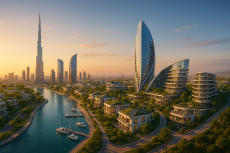Blog • Published on:August 18, 2025 | Updated on:September 18, 2025 • 14 Min
London’s Millionaires in 2025: Wealth Statistics
London has a its unique feel, polished, energetic, and tied to wealth in a way few places are. It’s a city that’s always pulled in people who’ve made it big. For years, it’s been a top choice for millionaires and billionaires looking to live well, invest smart, and stay globally connected.
But in 2025, the story’s getting more interesting. While many still see London as the place to be, others are moving on. So what’s driving the shift? This piece takes a closer look at who’s staying, who’s leaving, and why London continues to hold its place on the global wealth map, even as things start to shift.
London’s Millionaire Population in 2025
Here’s a quick look at London’s wealth numbers for 2025.
Currently, London is home to 227,000 millionaires, defined as individuals with at least £1 million in liquid assets or easily sellable investments. This marks a 3.8% increase from 2024, modest growth, but a clear indication that the city continues to attract and retain wealth.
Globally, it sits behind New York’s 349,500, Tokyo’s 298,300, Singapore 244,800, holding a firm spot among the world’s rich cities. After years of Brexit uncertainty, things have steadied. The pound’s value, hovering around $1.25, makes London a reasonable buy-in for foreigners eyeing property or business deals.
While it may not top the charts in millionaire numbers, London holds a distinct appeal. It isless frenetic than New York, more established than Dubai, and far more connected than quieter cities like Zurich.
The city blends finance, tech, and culture in a way that keeps it on the map for wealthy residents who want a base, not just a stopover.
What Keeps Millionaire Numbers Growing?
The growth comes from a few places. Overseas investors are investing money into tech startups and financial ventures. Property in prime spots, like Kensington or Chelsea, has climbed 4% in value this year, showing faith in the market.
London’s ability to adapt, from its banking roots to its newer tech scene, keeps the millionaire tally ticking up, even if it’s not a dramatic surge.
London’s Millionaire Demographics
London’s millionaire population is a mix of wealth creators and wealth inheritors, with individuals coming from diverse backgrounds and industries. The key groups include:
- Entrepreneurs & Business Owners: Many have built their wealth by founding companies in industries such as finance, technology, real estate, and luxury goods. London’s startup ecosystem and global connectivity make it a prime location for business success.
- Finance & Investment Professionals: High-earning bankers, hedge fund managers, and private equity executives form a significant portion of the millionaire class.
- Old Money & Inherited Wealth: Generational wealth plays a major role, with long-established British families and aristocratic lineages maintaining financial influence through property, trusts, and investments.
- International HNWIs: London’s status as a cosmopolitan capital attracts wealthy individuals from Europe, the Middle East, Asia, and North America. Many choose the city for its financial stability, legal system, and access to elite education.
The Ultra-Wealthy: $30 Million and More
There are around 4,750 ultra-high-net-worth (UHNW) Londoners with $30 million or more. They’re buying £20 million flats in Knightsbridge, jetting off privately, or hosting dinners in homes with postcode prestige.
Most, about 3,200, fall between $30M and $50M. Around 1,000 lands between $50M and $100M, and a small batch, maybe a few hundred, cross into $100M territory.
Main Investment Areas for UHNW Millionaires in London
London's UHNW individuals diversify their investments across various asset classes, focusing on stability, long-term growth, and prestige. Some of the key sectors attracting their capital include:
- Prime Real Estate: Luxury properties remain a cornerstone investment, with demand for high-value homes in areas like Mayfair, Kensington, and Belgravia. Many also invest in commercial real estate, including office buildings and retail spaces, for stable rental income and capital appreciation.
- Fine Art & Collectibles: The art market continues to thrive, with prestigious auction houses like Sotheby’s and Christie’s facilitating sales of high-value pieces. In 2025, some artworks have exceeded £18 million at auction, making fine art a preferred asset for wealth preservation and status.
- Sustainable & Green Investments: There is growing interest in eco-friendly ventures, such as solar farms, wind energy projects, and sustainable infrastructure. Investors are increasingly balancing profitability with environmental impact, aligning with global sustainability trends.
- Alternative Assets (Luxury Collectibles): Beyond traditional investments, UHNW individuals allocate funds to rare and appreciating assets such as classic cars, vintage watches, fine jewellery, and private wine collections. These tangible assets not only retain value but often appreciate over time.
- Technology & Startups: London's position as a global fintech hub makes it an attractive location for venture capital and private equity investments. Many UHNW individuals back early-stage companies in AI, biotech, and finance-related technology, seeking high-growth opportunities.
Living the UHNW Life in London
Discretion is key. London’s ultra-wealthy prefer a low-profile lifestyle, avoiding ostentatious displays of wealth. Rather than showcasing their fortunes on social media or mooring superyachts in high-visibility locations, they gravitate towards:
- Private Members’ Clubs: Exclusive venues in St James’s, Mayfair, and Chelsea, such as Annabel’s and 5 Hertford Street, serve as their social hubs, offering privacy and a refined atmosphere.
- Philanthropy & Cultural Patronage: Many engage in charity galas, foundation events, and arts sponsorships, particularly in Belgravia and South Kensington, blending influence with purpose.
- Discreet Business Engagements: Meetings take place in private lounges, boutique hotels, or boardrooms within the City, ensuring confidentiality while navigating major financial and investment decisions.
Billionaires: The Elite Circle in London
As of 2025, London is home to 36 billionaires, a slight decrease from 89 the previous year. This elite group comprises both longstanding affluent families and self-made magnates who have capitalized on contemporary industries.
Primary Industries and Wealth Sources
London's billionaires have amassed their fortunes across a diverse range of sectors:
- Finance and Investments: The city's status as a global financial centre has nurtured numerous billionaires in hedge funds, private equity, and banking. Notably, Michael Platt, co-founder of BlueCrest Capital Management, leads with an estimated net worth of £14.3 billion.
- Chemicals and Manufacturing: Industrial ventures have propelled individuals like Sir Jim Ratcliffe, founder of INEOS, to significant wealth, with a net worth of £13.1 billion.
- Technology and Digital Enterprises: The tech boom has given rise to fortunes in software, e-commerce, and fintech sectors. Entrepreneurs in these fields have seen rapid wealth accumulation, reflecting the sector's dynamic growth.
- Real Estate and Property Development: Investments in London's prime real estate market have yielded substantial returns, contributing to the wealth of several billionaires.
Wealth Distribution
The distribution of wealth among London's billionaires is notably uneven:
- Top 10 Billionaires: Collectively, they hold approximately £75 billion, accounting for a significant portion of the group's total wealth.
- Remaining Billionaires: The rest possess net worths ranging from £1 billion to several billion each, highlighting a concentration of wealth within the upper echelons.
Lifestyle and Influence
London's billionaires lead lifestyles marked by luxury and influence:
- Residences: They own expansive properties in prestigious areas such as Kensington, Chelsea, and Hampstead. Notably, The Bishops Avenue, often referred to as "Billionaires' Row," is renowned for its opulent mansions.
- Education: Their children often attend elite private schools, ensuring access to top-tier education.
- Social Circles: Memberships in exclusive clubs, such as Annabel's, provide venues for networking and leisure.
- Cultural and Political Influence: Beyond personal luxury, they play pivotal roles in shaping London's cultural landscape through philanthropy and exert considerable influence in political and economic spheres.
Why Do Millionaires Choose London?
Despite its high living costs, London continues to attract and retain millionaires from around the globe. Several key factors contribute to this enduring appeal:
1. Business Environment
- Financial Hub: London is home to over 500 banks, making it a global nexus for finance and investment. This concentration offers unparalleled opportunities for wealth growth and networking.
- Tech Innovation: The city's technology sector is booming, with startups securing significant investments. This dynamic ecosystem fosters innovation and attracts entrepreneurs seeking growth.
2. Property Investments
- Prime Real Estate: Neighborhoods like Belgravia and areas overlooking Hyde Park offer properties that are not only luxurious but also sound investments. Property values in these prime locations have shown consistent appreciation, outpacing inflation and providing stable returns.
3. Quality of Life
- World-Class Education: London boasts prestigious institutions such as Westminster and Harrow, offering top-tier education that appeals to affluent families.
- Cultural Richness: The city offers a vibrant cultural scene, including Michelin-starred restaurants in Mayfair and renowned theatres in the West End, providing diverse entertainment and lifestyle options.
- Connectivity: London's strategic location and excellent transport links make it convenient for both domestic and international travel, enhancing its appeal to those with global business interests.
4. Tax Policies
- Non-Domiciled Status: Historically, the UK's non-dom tax rules have allowed foreign residents to exclude overseas earnings from UK taxation, making it an attractive residence for international millionaires. However, upcoming changes to this policy may influence future decisions.
The Exodus of Millionaires from London
London is experiencing a significant outflow of millionaires, with 10,800 HNWIs leaving the UK in 2024—a 157% increase from the previous year. This trend equates to one millionaire departing every 45 minutes, profoundly impacting the city's economic landscape.
Factors Driving the Departure
Several key factors contribute to this exodus:
- Tax Policy Changes: The UK government's recent fiscal policies have introduced higher taxes on capital gains and income, alongside the abolition of the non-domiciled (non-dom) tax status. These changes have made the UK less attractive to HNWIs.
- Economic and Political Climate: Ongoing economic uncertainties and political shifts have led to a decline in business confidence, prompting many affluent individuals to seek more stable environments.
Preferred Destinations
Wealthy individuals leaving the UK are relocating to countries offering more favourable tax regimes and economic stability, such as:
- Italy: Attracts with flat tax deals.
- Switzerland: Offers financial privacy and a stable tax environment.
- United Arab Emirates: Entices with zero income tax policies.
- United States: Particularly states like Florida, which have no state income tax.
Government Response
In response to the outflow, the UK government is considering measures to retain HNWIs, such as:
- Tax Reforms: Proposals include a tiered tax system to replace the non-dom status, aiming to balance revenue generation with attractiveness to wealthy residents.
- Economic Incentives: Discussions are underway to enhance the UK's appeal through business-friendly policies and investment opportunities.
Economic Implications
The departure of millionaires has significant economic consequences:
- Reduced Spending: HNWIs contribute substantially to the economy through luxury spending and investments. Their exit leads to decreased demand in sectors like real estate, luxury goods, and services.
- Tax Revenue Decline: The loss of affluent taxpayers results in lower income from taxes, potentially affecting public services and infrastructure funding.
- Job Losses: Businesses catering to wealthy clients may downsize or close, leading to unemployment and further economic downturns.
Addressing this trend requires a balanced approach, ensuring that tax policies are fair yet competitive and that the UK's economic environment remains conducive to retaining and attracting HNWIs.
Main Investment Areas for Millionaires in London
In 2025, London's affluent individuals are strategically allocating their wealth across various sectors to ensure growth and stability. Key investment areas include:
1. Prime Real Estate
- Residential Properties: HNWIs continue to invest heavily in luxury homes located in prestigious neighbourhoods such as Belgravia, Notting Hill, and Kensington. These areas offer not only opulent living spaces but also promise robust capital appreciation. Despite a 26% decline in ultra-luxury property sales from the previous year, demand remains strong among affluent buyers, particularly from the United States.
- Commercial Real Estate: Investments in commercial properties, especially prime office spaces, are on the rise. For instance, Axa IM Alts has submitted plans to construct a 46-story skyscraper in the City of London, reflecting confidence in the demand for premium office locations.
2. Technology Ventures
- Startup Investments: The technology sector, particularly in areas like artificial intelligence, fintech, and health tech, continues to attract substantial investments. In 2025, startups in London secured significant funding, indicating a thriving ecosystem that promises high returns for early-stage investors.
- Family Office Engagements: Established financial entities like Schroders have expanded their services to cater to ultra-wealthy families, many of whom are channelling funds into tech and venture spaces. This trend is driven by a rise in liquidity events and the pursuit of innovative investment opportunities.
3. Sustainable Investments
- Green Energy Projects: There's a growing inclination towards eco-friendly investments, including wind farms, solar energy installations, and carbon capture initiatives. These projects not only offer potential financial returns but also align with environmental sustainability goals.
- Sustainable Real Estate: Developments focusing on energy efficiency and reduced carbon footprints are becoming increasingly popular among investors aiming to combine profitability with environmental responsibility.
4. Luxury Collectibles
- Art Investments: The art market remains a favoured avenue, with significant sales reported in 2025. Notably, Francis Bacon's "Man with Glasses III" is expected to fetch between £6 million and £9 million at auction, underscoring the enduring value of fine art as an investment.
- Classic Cars and Rare Wines: Collectibles such as vintage automobiles and fine wines continue to attract investors, offering both aesthetic pleasure and potential appreciation in value over time.
Citizenship and Residency Roots
Historically, the UK has attracted HNWIs through programs like the Tier 1 Investor Visa, which required a minimum investment of £2 million in UK assets, offering a pathway to residency and potential citizenship after five years. However, this visa route was closed to new applicants in February 2022.
For those who secured the Investor Visa before its closure, the journey to permanent residency remains viable. These investors often allocate funds to government bonds or UK businesses, balancing risk with reward.
In 2025, it's estimated that 60% of new ultra-wealthy residents followed this investment pathway, seeking benefits such as access to the UK's healthcare system, legal protections, and a globally respected passport.
Alternatively, individuals leverage family connections or employment opportunities to establish residency. The UK's non-domiciled ("non-dom") tax status has been a significant draw, allowing residents to exclude foreign earnings from UK taxation. However, this regime is set to be abolished in April 2025, prompting many to reassess their residency plans.
As the UK modifies its immigration and tax policies, HNWIs are exploring various avenues to secure residency, weighing the evolving benefits and obligations of life in the UK.
What’s Next for Millionaires in London
Looking ahead, projections suggest that London's millionaire population could reach approximately 250,000 by 2030. This anticipated growth aligns with the city's economic expansion, which is bolstered by strengthening trade ties with Asia and the United States.
However, upcoming tax reforms, particularly the planned abolition of the non-domiciled tax status in 2026, may influence the residency decisions of HNWIs.
Despite these challenges, London's unique blend of financial prowess, cultural richness, and global connectivity continues to make it a desirable destination for the affluent.
FAQs on London's Millionaire Landscape
1. What is the current number of millionaires in London as of 2025?
As of 2025, London is home to approximately 892,000 millionaires, reflecting a 3.8% increase from the previous year.
2. How are recent tax reforms affecting London's wealthy residents?
The UK government has announced the abolition of the non-domiciled (non-dom) tax status, effective from April 6, 2025. This change requires all UK residents to pay taxes on their global income, leading some HNWIs to reconsider their residency in the UK.
3. Which sectors are London millionaires investing in during 2025?
London's affluent individuals are diversifying their investments across prime real estate, technology ventures, sustainable projects, and luxury collectables, aiming for growth and stability in their portfolios.
4. What are the primary reasons for millionaires leaving London?
The significant outflow of millionaires from London is primarily attributed to recent tax policy changes, including the abolition of the non-dom tax status and economic uncertainties. These factors have prompted many to seek more favourable tax regimes and stable environments abroad.
5. How is the UK government responding to the exodus of millionaires?
In response to the departure of HNWIs, the UK government is considering measures such as tax reforms and economic incentives to retain and attract wealthy residents, aiming to balance revenue generation with maintaining the country's appeal to affluent individuals.
References
HM Revenue & Customs. (2024, October 30). Reforming the taxation of non-UK domiciled individuals. GOV.UK. https://www.gov.uk/government/publications/reforming-the-taxation-of-non-uk-domiciled-individuals
Office for Budget Responsibility. (2024, November 15). Economic and fiscal outlook – November 2024. https://obr.uk/efo/economic-and-fiscal-outlook-november-2024/
The Times. (2025, February 21). City bankers lobby Rachel Reeves on non-dom reforms. https://www.thetimes.co.uk/article/city-bankers-lobby-rachel-reeves-non-dom-reforms-ltn30hs62
Financial Times. (2024, November 1). UK tax plan for wealthy foreigners risks turning London into 'bigger version of Bahamas'. https://www.ft.com/content/54ee23f4-c49d-4079-b8f0-8136c2f67521
Le Monde. (2024, August 9). In the UK, two centuries of tax exemption for wealthy foreigners are about to end. https://www.lemonde.fr/en/economy/article/2024/08/09/in-the-uk-two-centuries-of-tax-exemption-for-wealthy-foreigners-are-about-to-end_6712079_19.html
New World Wealth & Henley & Partners. (2024). World’s Wealthiest Cities Report 2024. Henley & Partners. https://www.henleyglobal.com/publications/wealthiest-cities-2024
Written By

Alice Emmanuel
Alice Emmanuel is an expert in residency and citizenship by investment, specializing in government compliance and program optimization. With over 8 years of experience, she has guided high-net-worth individuals through acquiring global mobility and new citizenships, particularly in Europe, the Caribbean, and the Middle East. Alice's in-depth knowledge of Middle Eastern residency programs makes her a trusted advisor for investors seeking security and diversification in the region.
Related Articles









Recently Published









Book a free consultation


